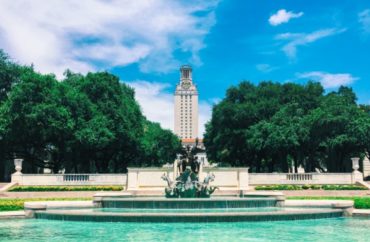
UPDATED
Bill declares outdoor areas public forums, punishes students who interfere with others’ speech
Texas lawmakers are on the verge of passing a measure that aims to protect free speech on public campuses in its state, the latest in a string of state legislators nationwide passing bills to promote free speech.
The Texas legislation is extremely similar to recent bills passed since 2017 in Kentucky, South Dakota, Tennessee, Colorado, Iowa, and Arkansas. The states passing the laws are mostly Republican-dominant states.
The measures follow certain patterns, like declaring outdoor areas as zones for public expression, or doing away with constitutionally-questionable “free speech zones.” Several also call for reports on how public universities are living up to their responsibilities concerning free speech and expression.
In Texas, the state senate passed the bill unanimously, with all 31 state senators voting in favor. The bill, whose primary sponsor is Sen. Joan Huffman, now moves to the state house. Republican Lt. Gov. Dan Patrick said the bill was one of his legislative priorities, The Texas Tribune reported.
The bill, SB18, ensures that “the common outdoor areas of the institution’s campus are deemed traditional public forums” and allows universities to impose time/place/manner restrictions as long as those restrictions follow published and viewpoint-neutral criteria and allow for “ample” alternative expression. The bill also allows members of the university community “to assemble or distribute written material without a permit or other permission” from the school.
In another move intended to combat campus mobs, the bill establishes “disciplinary sanctions for students, student organizations, or faculty who unduly interfere with the expressive activities of others on campus.”
Finally, the bill protects student organizations from denial of general university services based on the organization’s viewpoint. It also prevents universities from charging more in security fees from student organizations due to potentially controversial speakers. These demands have drawn criticism for being unconstitutional and unfairly extracting on student organizations, and are often defeated.
As part of an effort to hold campuses accountable, a report is required by Dec. 1 of 2020 concerning how the universities are implementing the bill’s requirements.
For example, the University of Miami eventually agreed to pay for the security fee of a talk by American Enterprise Institute scholar Charles Murray after pressure from law students, and UCLA dropped its security fee for a talk from Ben Shapiro after legal threats from the Alliance Defending Freedom.
Texas universities have dealt with issues concerning free speech on campus over the past year. The Texas Tribune recently reported that the University of Texas-Austin denied Democratic presidential candidate Beto O’Rourke’s campaign the right to distribute flyers on campus.
Last December, Speech First, a free speech advocacy group, sued UT-Austin claiming the school’s speech code has a chilling effect on student speech for banning “incivility,” “rude,” or “offensive” comments. That lawsuit is still winding its way through the courts.
The Young Conservatives of Texas chapter at Lone State College-CyFair, a smaller junior college, sued the school for derecognizing a student group after a video of an abortion debate was posted on Facebook. In that case, Lone Star College officials in May 2018 agreed to make policy changes to settle the suit.
The Lone Star College System agreed to pay the plaintiffs $13,250 and change two policies so that student groups won’t face discrimination owing to their viewpoints.
As for UT-Austin’s spokesman J.B. Bird defended the university’s policies, saying that most of its policies already aligned with what the bill proposes, the Tribune reports.
The criticism echoes similar responses from other states.
In South Dakota, the state’s Board of Regents criticized the bill as unnecessary due to the fact that the board had already adopted new policies. But state legislators said they wanted to lock in reforms via legislation.
The Foundation for Individual Rights in Education’s legislative counsel Tyler Coward previously told The College Fix in an email that despite the timing of President Trump’s executive order on free speech, many of these states were already moving toward taking legislative action.
“Most of the states that have campus free speech bills pending in the legislature saw those bills introduced early in their legislative session — as many as two or three months before the President announced or signed the executive order,” he said.
MORE: Kentucky passes free speech bill
IMAGE: Kristina Yu / Shutterstock
Correction: The article previously misidentified the source of the December 2018 lawsuit against UT-Austin. It was filed by Speech First. The article has been updated.
Like The College Fix on Facebook / Follow us on Twitter





Please join the conversation about our stories on Facebook, Twitter, Instagram, Reddit, MeWe, Rumble, Gab, Minds and Gettr.